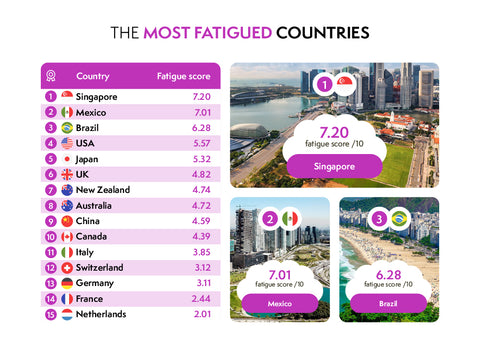Mexico is the 2nd most fatigued country in the world, according to new study

-
Taking the top spot, the most fatigued country is Singapore, with a fatigue score of 7.20. This small island nation in Southeast Asia is a bustling tech hub and the busy lives of Singaporeans lead to high levels of fatigue.
-
Mexico comes in second with a fatigue score of 7.01. Mexico has the ninth-largest economy in the world, so perhaps their growing economy is impacting the work-life balance of its working population
-
Brazil is the third most fatigued country, with a fatigue score of 6.28. This huge South American country is home to a fast-growing technology sector.
-
The USA also comes high on the list in fourth place, making the Americas the most fatigued continent with four countries in the top 10.
-
Mexican citizens work the most hours per year, clocking in 2,225 hours annually. This equates to working approximately 8.67 hours a day, five days a week with no holidays. That’s a lot of hours to put in!
-
Singaporeans work on average 2,238 hours per year, making them the second most worked population. The huge amount of time they put into their work would start to take its toll on anyone, leading to feelings of fatigue.
-
In China, people work around 2,174 hours each year, making it the country that works the third most hours.

-
Diet and exercise. Being active during the day (whether you go running or for a brisk walk) can help reduce stress and boost the amount of time you spend in the deeper/restorative stages of sleep. Try to avoid caffeine, alcohol, and large meals in the hours leading up to bedtime.
-
Avoid blue light. We’re all guilty of going on our devices before bedtime, but this has an adverse effect on our ability to sleep. The blue light prevents the production of the melatonin hormone, which aids sleep. If you find it hard to sleep, you could read a book instead.
-
Practice meditating. Meditation is a great way to destress and create that inner calmness before you hit the hay. There are plenty of free mindfulness resources out there to help you hone your technique and reach a perfect state of mind for sleep.
-
Create a comfortable space. Make sure your bedroom is a snug environment for sleeping. There are a variety of mattresses and pillows out there with different functions to suit your needs. It’s also important to ensure your bedroom is at a comfortable temperature to avoid a restless night.
-
Consistency is key. Going to sleep at the same time every night is good for your body clock and sleep consistency. So set a realistic timeframe and stick to it, even on the weekends (which is when routines are usually disrupted).
